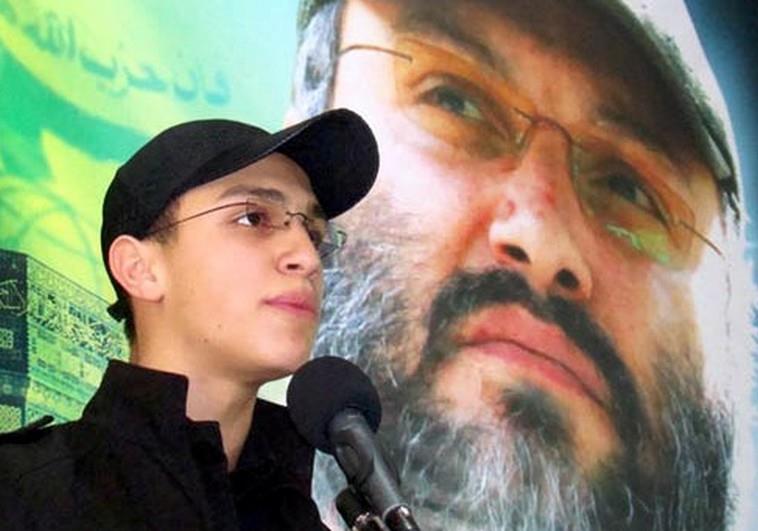Analyst: On Syria’s Soil, The Father, The Son, The Cause

Regardless of whether Jihad Imad Moughnieh was targeted in person or not, his martyrdom indeed simmered the scene. In fact, one cannot separate what’s humanitarian from what is political, when it is about this heroic generation of resistance men, and when it is about the tragedy of having the Syrian soil drenched in the blood of the father and the son.
Martyrs Imad and Jihad Mughnyieh
Would it be inappropriate if I told that I had shed a tear, and that the impact of this name, Jihad Imad Moughnieh, alone, had plagued my heart? Would it be wise if I asked about the magnitude of pain that would hold back the tears of Sayyed Hassan Nasrallah, while he studied, calmly, the givens and the options?
I am usually annoyed by the so-called “strategic analysts” who only repeat their lessons. That evening, I felt that I could not listen to those clichés. Those in the strategic operations room are the ones who are capable of taking the right decision subsequently. Now, all I have is my wish that that very right decision, to be made by the Resistance command, would be to retaliate. I have this deep sentiment that the key moment is looming; Syria does not only constitute the battlefield; Syria is the battle where all causes gather: Palestine vs the Zionist entity, the Resistance vs giving up, independence vs dependence, unity vs sectarian division, and humanity and civilization vs the wave of terrorism and Takfirism.
The Golan, alone, uncovers all these intertwining battles; as a matter of fact, while the “Israeli” rifle and the Takfiri sward unite, al-Qaeda’s and Wahhabi “Mujahidin” become “a good wall” for the occupation, so the Resistance men, soldiers and fighters, embrace in blood, from Syria to Lebanon, in one fate, in the face of the black alliance, with the son reviving the memory of his father; Jihad did not die. Instead, Imad has lived, on the same soil, for the same land, which snubs occupiers and borders.
So how did the Wahhabis and those affiliated with al-Qaeda meet the “Israelis?” We shall understand, then, that they originate from one same root that extends until Yahweh, the god of hatred, destruction and war; we will understand how sectarian is used for political purposes, a toll for the “Israelis.” We will understand as well how occupation, with its two obnoxious facets, is still the same. But what we cannot see unless with the heart is the conscience established by a young leader, who shone in faith and love. Would it be appropriate, here to talk about love? Is there other than love that leads to sacrifice?
Well, let us go back to the words of the reason. Why did the “Israelis” dash to counter the statements of Sayyed Nasrallah? Only three days after he said that the Resistance was fully ready to face any likely aggression and that the battle had moved to what’s beyond Galilee, “Israel” opted, with a central decision, for the worst and struck a target for Hizbullah in Qoneitra in Syria’s Golan. The strike, here, was intentional, to achieve an instant goal: to test and rebuff the effects of revealing the Resistance axis decision to counter “Israeli” attacks on Syria, with a blatant painful aggression. If Hizbullah retaliates soon, the enemy will be the one who has chosen the moment of the confrontation and the time of the war, and imposed its agenda on the local, regional, and international scenes. And, if the Resistance decides to postpone the retaliation, “Israel” will have succeeded in belying the credibility of the entire axis, mitigating the tension caused by the Sayyed’s fresh statements, and boosted the morale of the “Israelis” and the terrorists.
Sayyed’s appearance in a recorded TV interview, with a bundle of thoroughly selected messages, was linked to a series of key dossiers: curbing the “Israeli” military and political interference in Syria, hitting the “good wall” alongside the schemes of the terrorists in Golan and in South Syria, and confirming the unity of the northern front. On the political level, the key point is to improve the terms of negotiations for the parties of the Resistance axis on the local, regional, and international levels.
Then came the “Israeli” attack on Hizbullah in Qoneitra as an attempt to torpedo all those messages and to sow provocation and escalation, in order to break balance on the northern front, or to go to a war that would reverse the regional equations and put “Israel,” yet again, at the core of the Syrian dossier, hindering the inter-Syrian reconciliation, conducing the US-“Israeli” alliance to cut the way on any agreement with Iran over the nuclear dossier, and brushing aside pressures on Tel Aviv concerning Palestine.
As we said, the retaliation is not a proposal submitted by analysts, but a decision to be taken by the command. However, “Israel” has placed Hizbullah, Syria, Iran and Russia in front of a very difficult due date, politically speaking. But in the language of the heart, it is just a young man going up to the sky above the Golan, riding the horse of Imam Hussein; his name is Jihad Imad Moughnieh. He, alone, is the truth.







